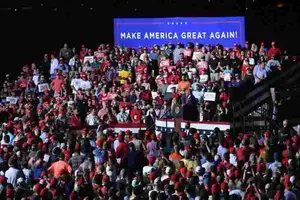
Imagine a beautiful beach where families are gathered on a clear day with blue skies. Different families are building sandcastles, while some are playing on the beach. No one is watching that a Tsunami of different waves is approaching the shore.
This is the vivid story told by previous United Nations Framework Convention on Climate Change executive secretary Christiana Figueres.
The first wave is the pandemic, followed by economic recession, then financial crisis and, finally, the big wave of climate warming.
Why are people and politicians still building sandcastles and looking the other way?
The more intriguing question is: What sandcastles are still being built? One is called democracy. Another is called freedom.
In the coming weeks, we shall witness the outcome of the Election of the century.
Since the 2008 financial crisis, several have lamented that democracy has been on the retreat. Electoral democracy is founded on the idea that each society chooses its own leaders through a one-citizen-one-vote system. Abuses of leadership are checked and balanced through the Montesquieu trinity of executive, judiciary and legislature. But with the emergence of Brexit, European populists and United States President Donald Trump by 2016, the game became uglier, as political and social views became polarised as wealth and social inequalities widened.
Even as land and stock market prices rose when interest rates went near zero, politicians sleepwalked through the seismic shift in social conditions as the bottom half of society became insecure from loss of jobs to technology, globalisation and rising levels of immigration.
Centrist moderates were seen by both the extreme left and right as having sold out to the powerful, and politics became more rigged, fractious and contested.
Will building the democracy sandcastle better at this point of time stop the tsunami crashing down on all of us? Surely the issue is to run and fight another day?
When the tsunami comes, all sandcastles will be swept away and there may not even be a beach anymore. But some will survive and the rebuilding must begin.
This is where the freedom sandcastle plays a critical role.
Individual freedom is an anchor of the Western value system, now spread through globalisation. But individual freedom comes with social obligations.
The pandemic posed this dilemma in sharp focus.
Several Americans and British feel that wearing a mask impinges on their individual freedom, but not doing so and not following social distancing rules have cost both societies more than 220,000 and 44,000 COVID-19 deaths respectively and rising.
On the assumption that each life costs US$10 million (S$13.6 million), the cost to both societies so far is about US$2.2 trillion and US$440 billion respectively.
Economist Larry Summers has calculated that the total cost of this pandemic so far is US$16 trillion for the US economy, or nearly three-quarters of the previous year's gross domestic product.
We can't blame democracy or freedom for such loss of life.
East Asian economies, from Japan, South Korea, Hong Kong, Singapore, Malaysia, Thailand and Vietnam (combined 2,552 deaths as of Oct 21), have shown that different systems can produce better pandemic management results than, say, Sweden (5,929 deaths), with a population that is 39 times larger.
We've not yet beaten Covid-19, as the virus is mutating as it spreads. Vaccines may be coming, but their usage will not be widespread till next year.
Winter is coming and death rates will increase as the seasonal influenza attacks.
More than ever, we should be prepared when the second and third waves of economic distress, unemployment and bankruptcies (all temporarily covered up by subsidies and debt forgiveness) surface by spring next year.
So why are we still building sandcastles as the waves crash down?
All this boils down to human psychology and reaction to unknowns.
Depending on experience and knowledge, as the 2004 Indian Ocean tsunami showed, some may still wander down to the beach to figure out what is going on.
There were nearly 230,000 deaths then, but not everyone ran for their own lives.
Several were brave enough to save others. Some stayed to help several others flee.
Clearly, those who deny the tsunami have an education problem, which simply boils down to a moral issue.
Is your individual freedom so important that you deny that this could put your loved ones and several other people at risk?
It's not just a health issue, the damage to the economy will be even more devastating. Central banks printing money can't stem the losses, because they do not address structural issues exposed by the pandemic.
Denial, blaming others, sheer incompetence and unwillingness to work with one another at all levels of society in the face of disaster have been hallmarks of those economies most devastated by the pandemic. All these show that while the science-based approach is validated by the health crisis, human beings do not decide by facts alone.
Our economic models based on dollars and cents can't measure the agony of the masses when they lose their jobs, health and dignity.
At the heart of human choice is ultimately a moral issue. Do you care only for yourself, or do you care more about other people and Mother Nature?
This is why the US election is ultimately a moral test, not a democratic or freedom issue. This election could be fair, rigged or legally contested.
Irrespective of who wins, and whether the election will result in a constitutional crisis requiring Supreme Court decisions, the test is how individuals involvedthe voters, presidential candidates, Supreme Court judges or Attorney-Generaldecide on their personal sense of moral values. Their decisions in the coming days will have far-reaching implications for themselves and the rest of us.
We will soon know whether we've four more years of shambolic chaos or perhaps a period of healing after the pandemic. God bless America and pray for us all.
• The writer comments on global issues from an Asian perspective for the Asia News Network, an alliance of 24 news media titles across the region.